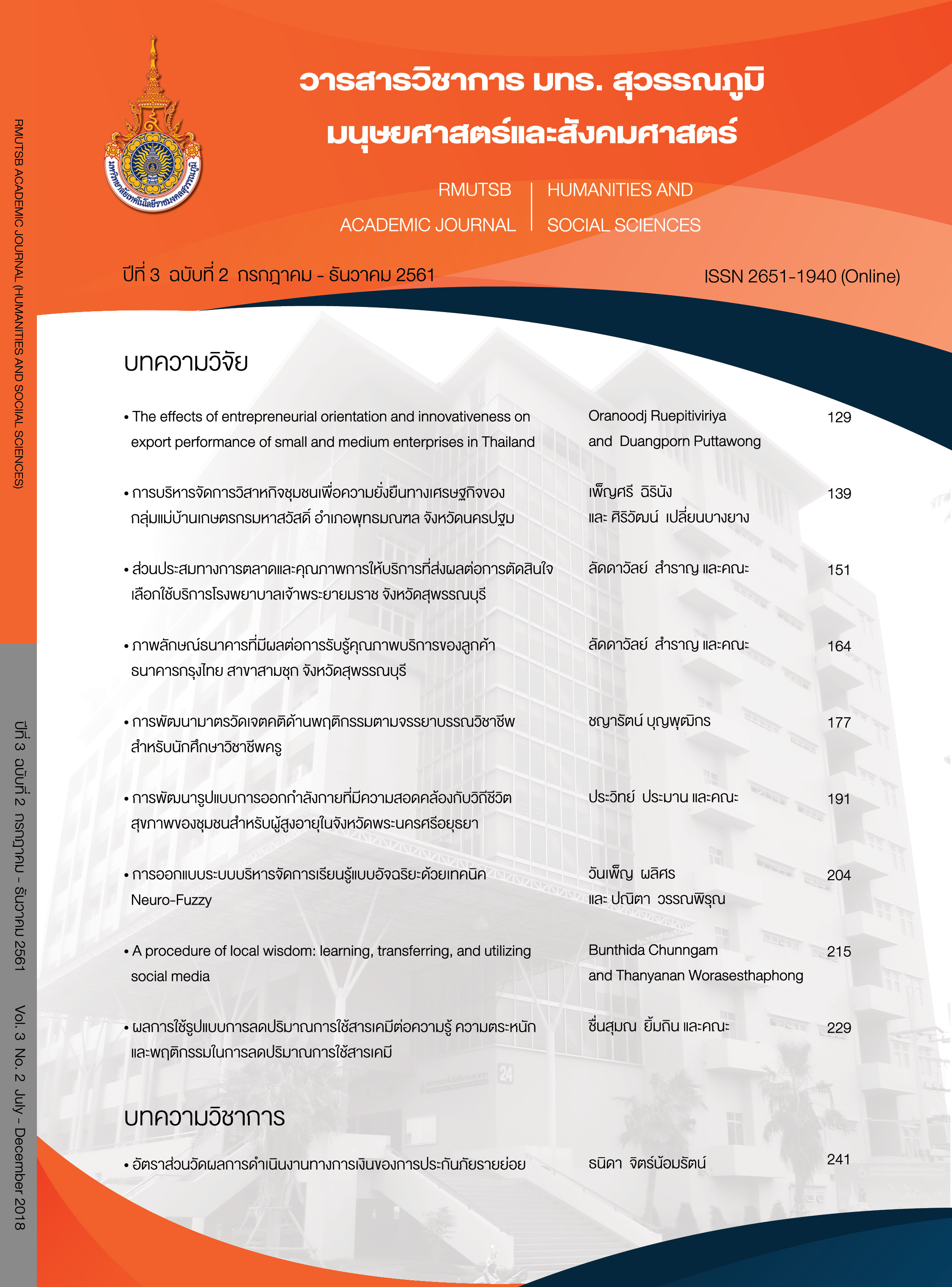The design of intelligent learning management system using Neuro-Fuzzy technique
Main Article Content
Abstract
The purposes of this research were to design and evaluate the intelligence learning management system using neuro-fuzzy technique. The study consisted of 2 phases. Phase 1 was to design the intelligence learning management system with SDLC step and phase 2 was to evaluate the suitability of the model for an intelligence learning management system using neuro-fuzzy technique. Questionnaires were used to evaluate the model such as learning environment and adaptive learning technique. The questionnaires were collected from five experts who had at least three years of teaching experience. The statistic used in this study are the mean and the standard deviation.
The results showed that the systems should include personalized modules devoted to suit individual learners. The modules should consist of seven parts: 1) communication 2) navigation 3) information 4) adaptive learning system 5) recommendation 6) database and 7) interface of responsive devices. The overall mean of their opinions agreed with the suitability of this model.
Article Details
References
ครูบ้านนอก.คอม. (2552). การเรียนการสอนรายบุคคล (Individualized Instruction). สืบค้น 20 มกราคม 2560, จาก http://www.
kroobannok.com/23054
ชัชวาลย์ เรืองประพันธ์. (2543). สถิติพื้นฐานพร้อมตัวอย่างการวิเคราะห์ด้วยโปรแกรม minitab SPSS และ SAS. ขอนแก่น: มหาวิทยาลัยขอนแก่น.
ฝ่ายผลิตหนังสือตำราวิชาการคอมพิวเตอร์. (2551). การวิเคราะห์และออกแบบระบบ. กรุงเทพฯ: ซีเอ็ดยูเคชั่น.
ถนอมพร เลาหจรัสแสง. (2541). คอมพิวเตอร์ช่วยสอน. กรุงเทพฯ: วงกมลโปรดักชั่น.
พรรณี ปานเทวัญ. (2559). การพัฒนาผู้เรียนในศตวรรษที่ 21 กับการเรียนรู้เชิงรุกในวิชาชีพพยาบาล. วารสารพยาบาลทหารบก, 17(3), 17-24.
สุนทร เกื้อกูล, และพยุง มีสัจ. (2548). การพัฒนาระบบสารสนเทศเพื่องานทะเบียนของโรงเรียนระดับมัธยม. ใน การประชุมวิชาการระดับชาติด้านคอมพิวเตอร์และเทคโนโลยีสารสนเทศ ครั้งที่ 1 (NCCIT05) (น. 444-449). กรุงเทพฯ: มหาวิทยาลัยเทคโนโลยี-พระจอมเกล้าพระนครเหนือ.
Antony, J., Thottupuram, F. R., Thomas, S., & John, M. V. (2012). Semantic web based adaptive E-Learning triggered through short message services. In 7th International Conference on Computer Science & Education (ICCSE 2012) (pp. 1860-1863). Melbourne, Australia: IEEE.
Atutor. (2016). ATutor features. Retrieved 18 December 2016, from http://www.atutor.ca/atutor/features.php
Bodyanskiy, Y., Vynokurova, O., Setlak, G., & Pliss, I. (2015). Hybrid neuro-neo-fuzzy system and its adaptive learning algorithm. In 10th International Scientific and Technical Conference “Computer Sciences and Information Technologies” (CSIT) (pp. 111-114). Lviv, Ukraine: IEEE.
Counting Calories. (2010). Online course structure. Retrieved 18 December 2016, from https://fsuofd.wordpress.com/
2010/08/10/online-course-structure/
Financesonline.com. (2016). Edmodo review learning management system. Retrieved 18 December 2016, from https://
reviews.financesonline.com/p/edmodo/
Hafidi, M., & Lamia, M. (2015). A personalized adaptive e-learning system based on learner's feedback and learner's multiple intelligences. In 12th International Symposium on Programming and Systems (ISPS) (pp. 1-6). Algiers, Algeria: IEEE.
Icoz, K., Sanalan, V. A., Ozdemir, E. B., Kaya, S., & Cakar, M. A. (2015). Using students’ performance to improve ontologies for intelligent E-learning system. Educational Science: Theory & Practice, 15(4), 1039-1049.
Jommongkol, J. (2005). Education system intelligence to forecast and applications. Chieng Mai: Faculty of engineering.
Kularbphettong, K. (2014). An adaptive Web-based intelligent tutoring using mastery learning and logistic regression techniques. Journal of Theoretical & Applied Information Technology, 66(1), 31-35.
Moodle. (2013). Database schema introduction. Retrieved 18 December 2016, from https://docs.moodle.org/dev/
Database_schema_introduction
Ouguengay, Y. A., El Faddouli, N-E., & Bennani, S. (2015). A Neuro-Fuzzy inference system for the evaluation of reading/writing competencies. Journal of Theoretical & Applied Information Technology, 81(3), 600-608.
Pongpech, A. (2012). Intelligent personalized learning system consideration. In 14th International Conference on Computer Modelling and Simulation (UKSim2012) (pp. 66-71). Cambridge, UK: IEEE.
Pumchalerm, S., Nilsook, P., & Jeerungsuwan, N. (2015). Design of intelligent cooperative education process management system on cloud computing technology. In The sixth TCU Proceedings of International e-Learning Conference 2015 (pp. 64-69). Bangkok, Thailand: Office of the Higher Education Commission.
Selvi, S. T., & Panneerselvam, K. (2012). A self-regulated learning approach for programming language using cloud-based learning management system. In International Conference on Recent Trends in Information Technology (ICRTIT-2012) (pp. 191-196). Chennai, Tamil Nadu, India: IEEE.


